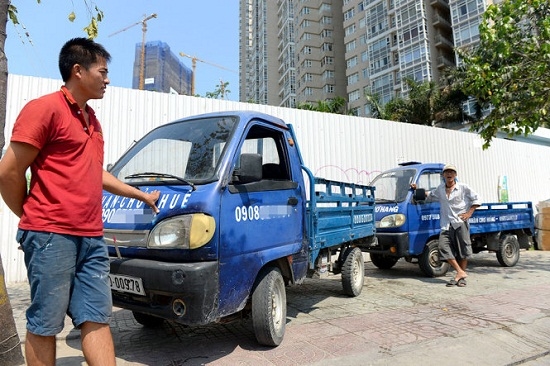 Society
Society

Many drivers and owners of motorised 4-wheel vehicles face business difficulties when their vehicles are denied certificates of quality and environmental control, reported the Tuổi Trẻ (Youth) newspaper.
 |
| Many drivers and owners of motorised 4-wheel vehicles face business difficulties when their vehicles are denied certificates of quality and environmental control, reported the Tuổi Trẻ (Youth) newspaper.— Photo vneconomy.vn |
HÀ NỘI — Many drivers and owners of motorised 4-wheel vehicles face business difficulties when their vehicles are denied certificates of quality and environmental control, reported the Tuổi Trẻ (Youth) newspaper.
After banning self-modified three-wheel vehicles from traffic to curb traffic accidents and congestion, the Government allowed the use of four-wheel vehicles instead.
These small vehicles are not automobiles. They are designed as small trucks for transporting cargo within the city. And they use electric engines or motorbike engines which run on gasoline.
At present, more than 10,000 four-wheel vehicles are being used nationwide under the trial project. But only 180 of these vehicles have certificates of technical safety and environmental protection.
These 4-wheel motorized vehicles are not classified as automobiles or motorbikes. So authorised agencies are often confused about whether or not to grant them quality control certificates. And drivers and vehicle owners often face trouble with traffic police when using them.
Thanh Hóa Province resident Trần Văn Luân, whose family is living on his goods transporting service, expressed anger at being fined VNĐ2.5 million (US$110) for driving without a certificate of technical safety and environmental protection. He tried to explain to the police that he didn’t know where to get the certificates, the newspaper reported.
Luân said he had been trying to get the required certificates since buying the car. But all his attempts had failed, so far.
“I went to some vehicle quality control agencies. But officials refused to grant the certificates. They even said I was crazy to ask for the certificates”, said Luân. “But traffic police fined me for not having the certificates”, he said.
Many drivers of motorized 4-wheel vehicles still face the same problems as Luân.
Meanwhile, Colonel Huỳnh Trung Phong of HCM City’s traffic Police affirmed that fining motorised 4-wheel vehicles was lawful. "Getting the required certificates is the duty of drivers and vehicle owners. And granting these certificates is the responsibility of quality control agencies," Phong said.
In a follow-up report yesterday Tuổi Trẻ said that the Việt Nam Register Department asked registering agencies to review registration procedures for the vehicles.
The registration policy is justified. But implementation has caused difficulties for people. Poor people spend about VNĐ65 million (US$3,000) for new 4-wheel vehicles. But every day owners of these vehicles worry about traffic police targetting them while they do their work.
The government issued a ban on self-modified three-wheel vehicles in 2007.
According to the HCM City Traffic Police, there were 60,000 no-engine three-wheelers and some 1,500 engine-powered three-wheelers in the city alone before 2007. The ban has seriously affected drivers, most of whom are poor working people.
These types of vehicles are useful for transporting goods in areas where roads are often too narrow for even mini-trucks. Hawkers at markets and construction material shops depend on three-wheelers to transport their goods. Such businesses will be affected by the ban.
But 3-wheelers hinder the smooth flow of city traffic, which affects business. These vehicles do not have enough capacity to load people or cargo, compared to cars, buses and trucks. But they occupy a lot of road space and cause severe traffic jams and road blockages. — VNS




